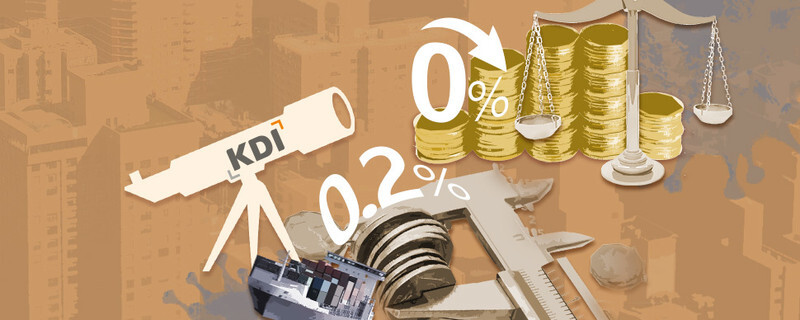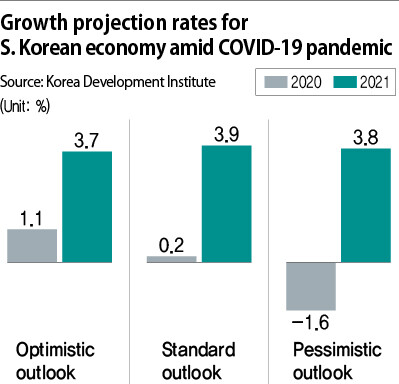hankyoreh
Links to other country sites 다른 나라 사이트 링크
KDI projects growth rate of 0.2% for 2020

The Korea Development Institute (KDI), a state-run think tank, projected an economic growth rate of just 0.2% for South Korea this year amid the effects of the novel coronavirus pandemic. The economy was predicted to grow by 3.9% next year, which the KDI concluded would fall short of a full economic recovery.
On May 20, the KDI published a report titled “Economic Outlook, First Half of 2020,” in which it projected a growth rate of 0.2% for the South Korean economy, a reduction of 2.1 percentage points from the 2.3% projection of November 2019, before the COVID-19 pandemic. It was also substantially higher than the -1.2% projection issued by the International Monetary Fund (IMF) last month.
As the major factor inhibiting economic growth this year, the KDI cited predictions that exports would decline by 15.9% from last year amid the pandemic and the sealing of borders in major countries. Private consumption was predicted to decline by 2% from last year amid efforts to avoid in-person interactions, while consumer prices were predicted to increase by just 0.4% amid the economic contraction and plunge in oil prices. Investment was projected to rise by 1.5% amid growing demand in the semiconductor and construction sectors.
The KDI estimated that the recent allocation of initial and second supplementary budgets totaling 23.9 trillion won (US$19.4 billion) as a response to the outbreak had the effect of raising gross domestic product (GDP) by around 0.5%. It also predicted that the growth rate could rise from its current 0.2% projection with the allocation of a third supplementary budget of around 30 trillion won (US$24.4 billion) that the administration is currently developing.
Projections based on assumption that virus’ spread will abate within 2020

The projections were based on the assumption that the virus’ spread will abate within the first half of 2020 in South Korea and the second half for the world as a whole, allowing for a recovery of economic activity. KDI predicted that if the virus’s spread continues and the economic contraction persists through the end of the year.
“Uncertainty is quite high, so there’s a strong chance of negative growth at a similar level to the possibility of positive growth,” explained Jung Kyu-chul, director of the KDI’s economic forecasting office.
As a response to the pressures of declining business conditions and prices, the KDI advised that the Bank of Korea (BOK) should lower the benchmark interest rate to as close to 0% as possible as quickly as possible. Noting that a lower interest rate alone is insufficient to achieve an economic recovery and stable level of increase in prices, it also stressed the need to proactively employ non-traditional monetary policy approaches such as the purchasing of government bonds.
In terms of fiscal policy, it advised responding proactively to the crisis caused by the virus while at the same time being cautious in determining the scale of additional fiscal outlays after the third supplementary budget. This was based on concerns that a high rate of increase in the budget deficit could create problems in terms of national fiscal soundness. The report also advised that if additional fiscal expenditures become necessary this year, they should be focused on limited-time projects, and that if the government intends to pursue projects in areas such as social services that are likely to become firmly established in the intermediate to long term, it will need to establish plans for establishing fiscal revenues, including an increase in taxation.
By Lee Kyung-mi, staff reporter
Please direct comments or questions to [english@hani.co.kr]

Editorial・opinion
![[Column] Season 2 of special prosecutor probe may be coming to Korea soon [Column] Season 2 of special prosecutor probe may be coming to Korea soon](https://flexible.img.hani.co.kr/flexible/normal/500/300/imgdb/original/2024/0426/3317141030699447.jpg) [Column] Season 2 of special prosecutor probe may be coming to Korea soon
[Column] Season 2 of special prosecutor probe may be coming to Korea soon![[Column] Park Geun-hye déjà vu in Yoon Suk-yeol [Column] Park Geun-hye déjà vu in Yoon Suk-yeol](https://flexible.img.hani.co.kr/flexible/normal/500/300/imgdb/original/2024/0424/651713945113788.jpg) [Column] Park Geun-hye déjà vu in Yoon Suk-yeol
[Column] Park Geun-hye déjà vu in Yoon Suk-yeol- [Editorial] New weight of N. Korea’s nuclear threats makes dialogue all the more urgent
- [Guest essay] The real reason Korea’s new right wants to dub Rhee a founding father
- [Column] ‘Choson’: Is it time we start referring to N. Korea in its own terms?
- [Editorial] Japan’s rewriting of history with Korea has gone too far
- [Column] The president’s questionable capacity for dialogue
- [Column] Are chaebol firms just pizza pies for families to divvy up as they please?
- [Column] Has Korea, too, crossed the Rubicon on China?
- [Correspondent’s column] In Japan’s alliance with US, echoes of its past alliances with UK
Most viewed articles
- 1‘We must say no’: Seoul defense chief on Korean, USFK involvement in hypothetical Taiwan crisis
- 2AI is catching up with humans at a ‘shocking’ rate
- 3Division commander ordered troops to enter raging flood waters before Marine died, survivor says
- 4Is Japan about to snatch control of Line messenger from Korea’s Naver?
- 5The dream K-drama boyfriend stealing hearts and screens in Japan
- 6Korea protests Japanese PM’s offering at war-linked Yasukuni Shrine
- 7[Column] Season 2 of special prosecutor probe may be coming to Korea soon
- 8‘Weddingflation’ breaks the bank for Korean couples-to-be
- 9“Korea is so screwed!”: The statistic making foreign scholars’ heads spin
- 10[Column] ‘Choson’: Is it time we start referring to N. Korea in its own terms?